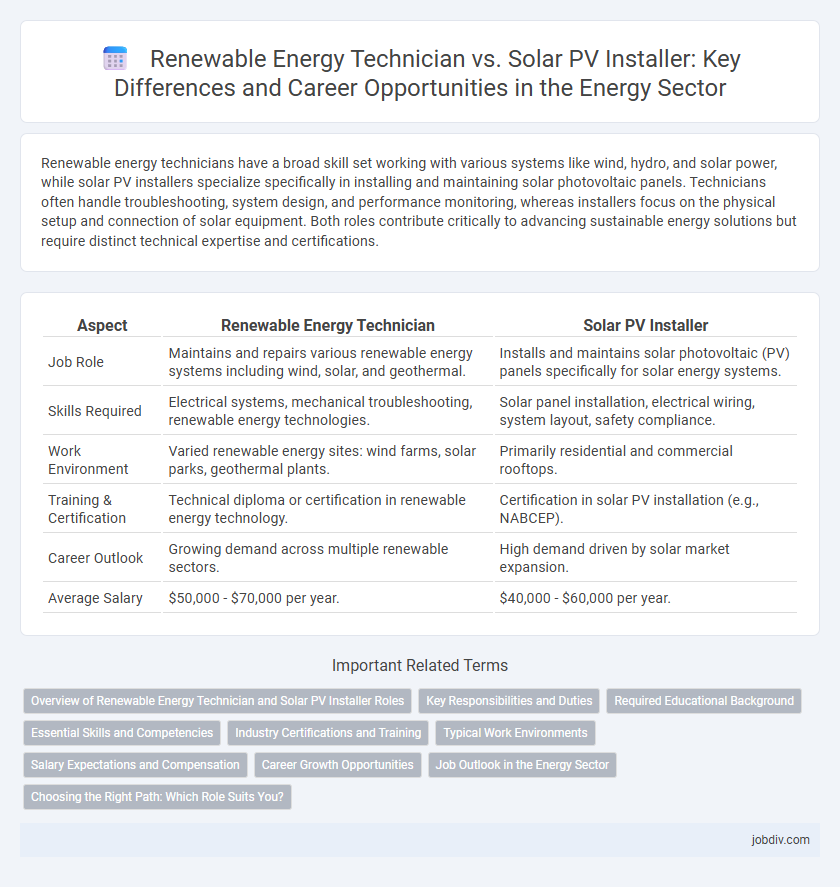Renewable energy technicians have a broad skill set working with various systems like wind, hydro, and solar power, while solar PV installers specialize specifically in installing and maintaining solar photovoltaic panels. Technicians often handle troubleshooting, system design, and performance monitoring, whereas installers focus on the physical setup and connection of solar equipment. Both roles contribute critically to advancing sustainable energy solutions but require distinct technical expertise and certifications.
Table of Comparison
| Aspect | Renewable Energy Technician | Solar PV Installer |
|---|---|---|
| Job Role | Maintains and repairs various renewable energy systems including wind, solar, and geothermal. | Installs and maintains solar photovoltaic (PV) panels specifically for solar energy systems. |
| Skills Required | Electrical systems, mechanical troubleshooting, renewable energy technologies. | Solar panel installation, electrical wiring, system layout, safety compliance. |
| Work Environment | Varied renewable energy sites: wind farms, solar parks, geothermal plants. | Primarily residential and commercial rooftops. |
| Training & Certification | Technical diploma or certification in renewable energy technology. | Certification in solar PV installation (e.g., NABCEP). |
| Career Outlook | Growing demand across multiple renewable sectors. | High demand driven by solar market expansion. |
| Average Salary | $50,000 - $70,000 per year. | $40,000 - $60,000 per year. |
Overview of Renewable Energy Technician and Solar PV Installer Roles
Renewable Energy Technicians specialize in maintaining and repairing various energy systems, including solar, wind, and geothermal technologies, ensuring optimal performance and safety compliance. Solar PV Installers focus primarily on the installation, inspection, and troubleshooting of photovoltaic solar panels, maximizing energy capture from solar resources. Both roles require technical skills and knowledge of electrical systems, but Renewable Energy Technicians have a broader scope across multiple renewable technologies, while Solar PV Installers concentrate specifically on solar energy systems.
Key Responsibilities and Duties
Renewable Energy Technicians are responsible for installing, maintaining, and repairing a range of renewable energy systems, including solar, wind, and geothermal technologies, ensuring optimal performance and safety standards. Solar PV Installers specialize in the installation and maintenance of photovoltaic solar panel systems, focusing on site assessment, panel mounting, wiring, and system testing to maximize energy output. Both roles require technical knowledge and adherence to regulatory guidelines, but Renewable Energy Technicians often engage with multiple energy sources, whereas Solar PV Installers concentrate solely on solar energy systems.
Required Educational Background
A Renewable Energy Technician typically requires a background in electrical engineering or renewable energy technology, often supported by an associate degree or technical certification. Solar PV Installers usually need a high school diploma plus specialized training from vocational schools or apprenticeships focused on photovoltaic systems. Both roles benefit from hands-on experience and certifications like the NABCEP credential for Solar PV Installers to enhance job prospects.
Essential Skills and Competencies
Renewable Energy Technicians require a broad understanding of multiple energy systems, including wind, solar, and geothermal, with skills in electrical systems, troubleshooting, and system maintenance. Solar PV Installers specialize in photovoltaic technology, emphasizing proficiency in solar panel installation, wiring, and adherence to safety regulations. Both roles demand competencies in problem-solving, technical knowledge, and compliance with industry standards, but Renewable Energy Technicians typically possess more diverse technical expertise across renewable energy sources.
Industry Certifications and Training
Renewable Energy Technicians typically require industry certifications such as the North American Board of Certified Energy Practitioners (NABCEP) certification and comprehensive training in diverse energy systems including wind and solar technologies. Solar PV Installers often pursue specialized NABCEP Entry Level or PV Installation Professional certifications, focusing primarily on photovoltaic system installation, maintenance, and safety protocols. Both roles benefit from OSHA safety training and state-specific licensing, but technicians generally require broader technical knowledge and multi-disciplinary credentials.
Typical Work Environments
Renewable Energy Technicians typically work in diverse environments including wind farms, hydroelectric plants, and solar installations, often navigating outdoor and sometimes remote sites. Solar PV Installers primarily operate on residential and commercial rooftops, requiring work at height and exposure to varying weather conditions. Both roles demand adherence to safety protocols but differ in their specific setting and technical focus within the renewable energy sector.
Salary Expectations and Compensation
Renewable Energy Technicians typically earn an average annual salary ranging from $45,000 to $65,000, with compensation influenced by certifications and experience in broader renewable systems. Solar PV Installers have a median salary around $40,000 to $55,000 but may receive additional incentives such as performance bonuses or overtime pay related to solar panel installations. Geographic location and employer size significantly impact salary expectations for both roles within the renewable energy sector.
Career Growth Opportunities
Renewable Energy Technicians have broader career growth opportunities due to their expertise in multiple energy systems such as wind, geothermal, and bioenergy, making them versatile in the expanding green energy market. Solar PV Installers specialize in photovoltaic systems, offering steady growth as solar energy adoption increases globally, but career advancement may be limited without additional certifications. Both roles benefit from ongoing training, with Renewable Energy Technicians often progressing into supervisory or technical specialist positions, while Solar PV Installers can advance into system design or sales roles.
Job Outlook in the Energy Sector
The job outlook for Renewable Energy Technicians is robust, with a projected growth rate of 11% through 2031, driven by expanding demand for wind, solar, and other renewable technologies. Solar PV Installers specifically face rapid growth estimated at 20% over the same period, fueled by increasing solar panel installations nationwide. Both roles contribute significantly to the energy sector's transition towards sustainable sources, offering strong employment opportunities and competitive salaries.
Choosing the Right Path: Which Role Suits You?
Renewable Energy Technicians work with diverse technologies including wind, solar, and geothermal systems, requiring broad technical skills and adaptability. Solar PV Installers specialize in solar panel installation and maintenance, offering focused expertise ideal for those passionate about solar energy. Choosing between these roles depends on whether you prefer a versatile career across renewable sectors or a specialized path focused exclusively on solar power.
Renewable Energy Technician vs Solar PV Installer Infographic

 jobdiv.com
jobdiv.com